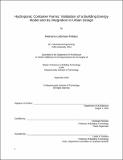Hydroponic container farms : validation of a building energy model and its integration in urban design
Author(s)
Liebman-Peláez, Mariana.
Download1288582835-MIT.pdf (1.788Mb)
Alternative title
Validation of a building energy model and its integration in urban design
Other Contributors
Massachusetts Institute of Technology. Department of Architecture.
Advisor
Christoph Reinhart.
Terms of use
Metadata
Show full item recordAbstract
Controlled environment agriculture (CEA) systems, or plant factories, have developed within the urban context following efforts to expand local food production and provide an alternative to conventional agriculture with lower rates of greenhouse gas emissions and resource consumption. One urban CEA system, container farms, consist of vertical hydroponic farms inside retrofitted shipping containers. The artificially controlled interior environments within container farms along with their portability and modularity allow container farms to grow food in a variety of otherwise unused locations regardless of climate and daylight availability. While container farms and plant factories in general may provide a promising option for sustainable urban agriculture, they are highly energy intensive, particularly for lighting and thermal control. As a result, urban designers and policy makers require holistic assessment tools and methodologies to understand the viability of plant factories in reducing the greenhouse gas emissions of food systems. However, due to limitations of building performance simulation (BPS) tools, existing urban design methodologies assess the energy use of plant factories using simplified building energy models that omit the energetic effects of plants. While previous studies have developed methods that consider plant-air interactions within BPS tools through the use of co-simulators, to date there has been a lack of energy validation studies for such models. This research attempts to bridge this gap by validating a first-principle hourly energy model for an operational hydroponic container farm located in Boston, Massachusetts. The energy model (NMBE of 3% and CV[RMSE]of 9%) combines a plant evapotranspiration model in parallel with a BPS tool, EnergyPlus. The validation focuses on the reliability of the energy model in predicting hourly conditioning loads and comments on the practical challenges and limitations of modeling hourly conditioning for container farms and other plant factories. Second, this research uses the validated energy model to simulate methods for reducing conditioning loads of container farms under various climate and upgrade scenarios. Finally, this research explores the integration of container farms in an urban neighborhood and the potential for reducing additional demands on the neighborhood's energy supply system.
Description
Thesis: S.M. in Building Technology, Massachusetts Institute of Technology, Department of Architecture, September, September, 2020 Cataloged from the official PDF of thesis. "September 2020." Includes bibliographical references (pages 53-56).
Date issued
2020Department
Massachusetts Institute of Technology. Department of ArchitecturePublisher
Massachusetts Institute of Technology
Keywords
Architecture.